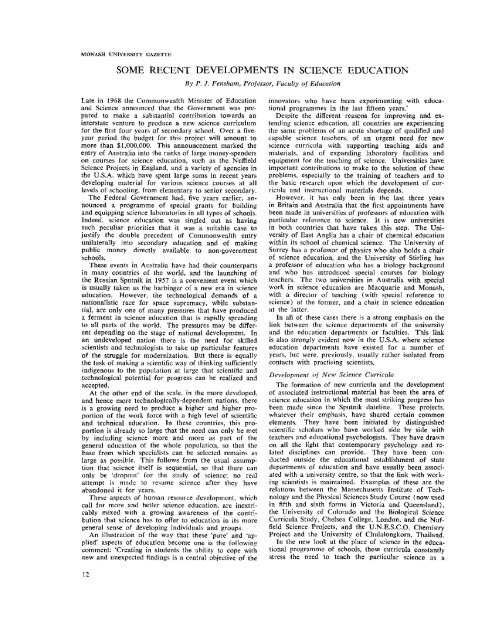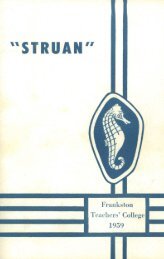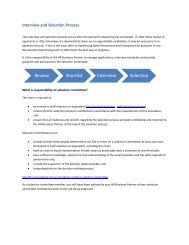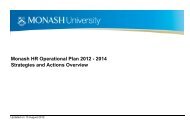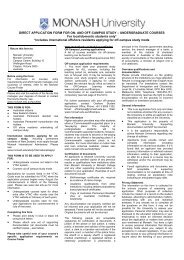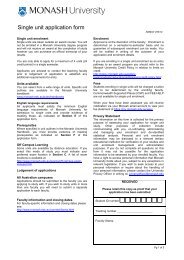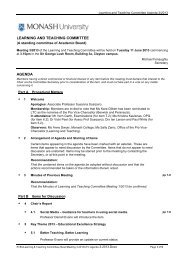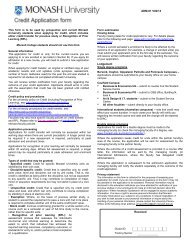Volume 6 Number 1 - Adm.monash.edu - Monash University
Volume 6 Number 1 - Adm.monash.edu - Monash University
Volume 6 Number 1 - Adm.monash.edu - Monash University
You also want an ePaper? Increase the reach of your titles
YUMPU automatically turns print PDFs into web optimized ePapers that Google loves.
MONASH UNIVERSITY GAZETTE<br />
SOME RECENT DEVELOPMENTS IN SCIENCE EDUCATION<br />
By P. J. Fensham, Professor, Faculty of Education<br />
Late in 1968 the Commonwealth Minister of Education<br />
and Science announced that the Government was prepared<br />
to make a substantial contribution towards an<br />
interstate venture to produce a new science curriculum<br />
for the first four years of secondary schooL Over a fiveyear<br />
period the budget for this project will amount to<br />
more than $1,000,000. This announcement marked the<br />
entry of Australia into the ranks of large money-spenders<br />
on courses for science <strong>edu</strong>cation, such as the Nuffield<br />
Science Projects in England, and a variety of agencies in<br />
the U.S.A. which have spent large sums in recent years<br />
developing material for various science courses at all<br />
levels of schooling, from elementary to senior secondary.<br />
The Federal Government had, five years earlier, announced<br />
a programme of special grants for building<br />
and equipping science laboratories in all types of schools.<br />
Indeed. science <strong>edu</strong>cation was singled out as having<br />
such peculiar priorities that it was a suitable case to<br />
justify the double precedent of Commonwealth entry<br />
unilaterally into secondary <strong>edu</strong>cation and of making<br />
public money directly available to non-government<br />
schooTs.<br />
These events in Australia have had their counterparts<br />
in many countries of the world. and the launching of<br />
the Russian Sputnik in 1957 is a convenient event which<br />
is usually taken as the harbinger of a new era in science<br />
<strong>edu</strong>cation. However, the technological demands of a<br />
nationalistic race for space supremacy, while substantial,<br />
are only one of many pressures that have produced<br />
a ferment in science <strong>edu</strong>cation that is rapidly spreading<br />
to aU parts of the world. The pressures may be different<br />
depending on the stage of national development. In<br />
an undeveloped nation there is the need for skilled<br />
scientists and technologists to take up particular features<br />
of the struggle for modernization. But there is equally<br />
the task of making a scientific way of thinking sufficiently<br />
indigenous to the population at large that scientific and<br />
technological potential for progress can be realized and<br />
accepted.<br />
At the other end of the scale. in the more developed,<br />
and hence more technologically-dependent nations, there<br />
is a growing need to produce a higher and higher proportion<br />
of the work force with a high level of scientific<br />
and technical <strong>edu</strong>cation. In these countries, this proportion<br />
is already so large that the need can only be met<br />
by including science more and more as part of the<br />
general <strong>edu</strong>cation of the whole population, so that the<br />
base from which specialists can be selected remains as<br />
large as possible. This follows from the usual assumption<br />
that science itself is sequential, so that there can<br />
only be 'dropout' for the study of science; no real<br />
attempt is made to resume science after they have<br />
abandoned it for years.<br />
These aspects of human resource development, which<br />
call for more and better science <strong>edu</strong>cation. are inextricably<br />
mixed with a growing awareness of the contribution<br />
that science has to offer to <strong>edu</strong>cation in its more<br />
general sense of developing individuals and groups.<br />
An illustration of the way that these 'pure' and 'applied'<br />
aspects of <strong>edu</strong>cation become one is the following<br />
comment: 'Creating in students the ability to cope with<br />
new and unexpected findings is a central objective of the<br />
innovators who have been experimenting with <strong>edu</strong>cational<br />
programmes in the last fifteen years.'<br />
Despite the different reasons for improving and extending<br />
science <strong>edu</strong>cation, all countries are experiencing<br />
the same problems of an acute shortage of qualified and<br />
capable science teachers, of an urgent need for new<br />
science curricula with supporting teaching aids and<br />
materials. and of expanding laboratory facilities and<br />
equipment for the teaching of science. Universities have<br />
important contributions to make to the solution of these<br />
problems, especially to the training of teachers and to<br />
the basic research upon which the development of curricula<br />
and instructional materials depends.<br />
However, it has only been in the last three years<br />
in Britain and Australia that the first appointments have<br />
been made in universities of professors of <strong>edu</strong>cation with<br />
particular reference to science. It is new universities<br />
in both countries that have taken this step. The <strong>University</strong><br />
of East Anglia has a chair of chemical <strong>edu</strong>cation<br />
within its school of chemical science. The <strong>University</strong> of<br />
Surrey has a professor of physics who also holds a chair<br />
of science <strong>edu</strong>cation, and the <strong>University</strong> of Stirling has<br />
a professor of <strong>edu</strong>cation who has a biology background<br />
and who has introduced special courses for biology<br />
teachers. The two universities in Australia with special<br />
work in science <strong>edu</strong>cation are Macquarie and <strong>Monash</strong>,<br />
with a director of teaching (with special reference to<br />
science) at the former, and a chair in science <strong>edu</strong>cation<br />
at the latter.<br />
In all of these cases there is a strong emphasis on the<br />
link between the science departments of the university<br />
and the <strong>edu</strong>cation departments or faculties. This link<br />
is also strongly evident now in the U.S.A. where science<br />
<strong>edu</strong>cation departments have existed for a number of<br />
years, but were. previously, usually rather isolated from<br />
contacts with practising scientists.<br />
Development of New Science Curricula<br />
The formation of new curricula and the development<br />
of associated instructional material has been the area of<br />
science <strong>edu</strong>cation in which the most striking progress has<br />
been made since the Sputnik dateline. These projects.<br />
whatever their emphasis, have shared certain common<br />
clements. They have been initiated by distinguished<br />
scientific scholars who have worked side by side with<br />
teachers and <strong>edu</strong>cational psychologists. They have drawn<br />
on all the light that contemporary psychology and related<br />
disciplines can provide. They have been conducted<br />
outside the <strong>edu</strong>cational establishment of state<br />
departments of <strong>edu</strong>cation and have usually been associated<br />
with a university centre, so that the link with working<br />
scientists is maintained. Examples of these are the<br />
relations between the Massechusetts Institute of Technology<br />
and the Physical Sciences Study Course (now used<br />
in fifth and sixth forms in Victoria and Queensland),<br />
the <strong>University</strong> of Colorado and the Biological Science<br />
Curricula Study, Chelsea College. London, and the Nuffield<br />
Science Projects, and the U.N.RS.C.O. Chemistry<br />
Project and the <strong>University</strong> of Chulalongkorn, Thailand.<br />
In the new look at the place of science in the <strong>edu</strong>cational<br />
programme of schools, these curricula constantly<br />
stress the need to teach the particular science as a<br />
12


